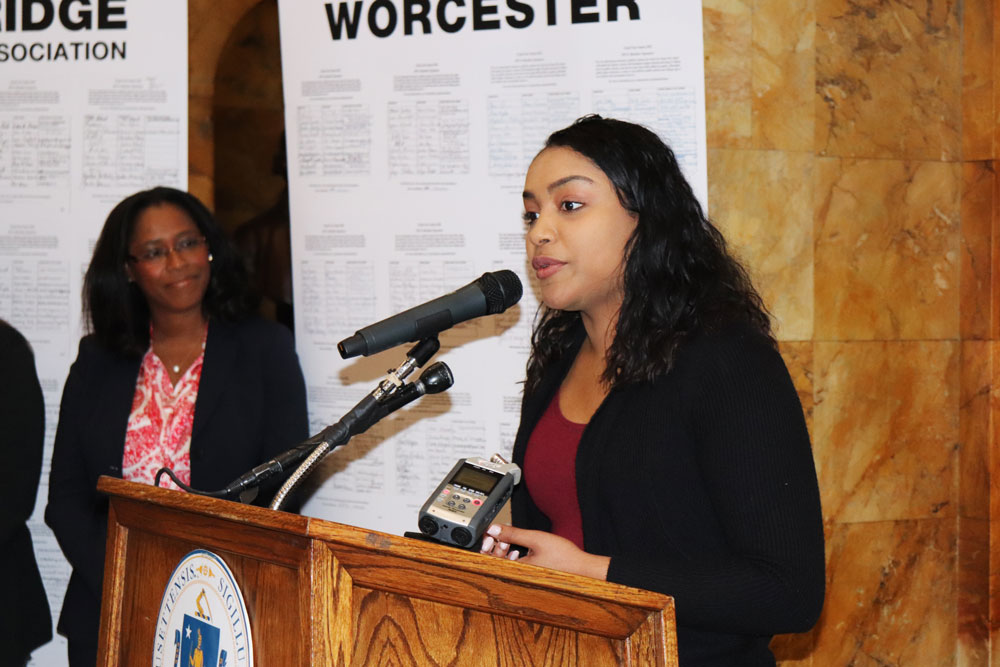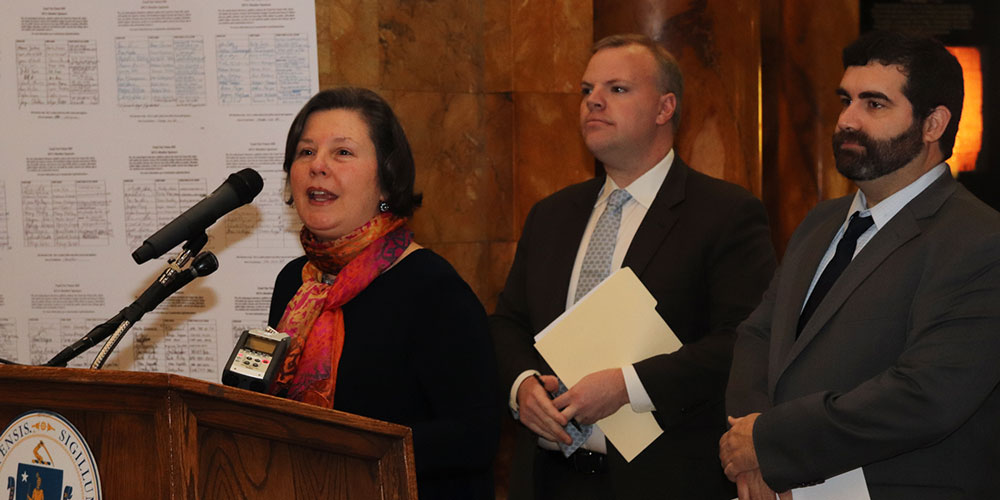Sign the Petition
Call on your legislator to pass education funding bills this spring.
Higher ed bill backed by Fund Our Future and MTA is filed

Students, educators, legislators and community leaders from across Massachusetts gathered at the State House on January 16 to announce the filing of a higher education funding bill that is backed by the MTA and other members of the Fund Our Future coalition as part of the broader education funding plan. The coalition also presented signatures from 15,000 MTA members and launched a statewide online petition drive to collect more signatures in support of the funding bills.
“We need more funding from the state so that we can continue to provide high-quality, affordable higher education to Massachusetts students,” said Anneta Argyres, director of the Labor Extension Program at UMass Boston. “We are seeing the effects of underfunding at UMass Boston — cuts to programs, understaffing, larger class sizes and increased fees — all of which make it harder for our students to complete their education. Passing this legislation will help us stop the cuts and reinvest in our campuses, communities and students.”
The CHERISH Act, filed by Senator Jo Comerford (D-Northampton) in the Senate and by Representatives Sean Garballey (D-Arlington) and Paul Mark (D- Peru) in the House, would raise more than $500 million for public higher education once fully phased in. Last week, the coalition announced its support for the Education PROMISE Act, which would increase preK-12 funding by more than $1 billion a year. Both bills together are at the center of the Fund Our Future campaign.

“It's critically important that we increase funding for our state's higher education system, but many of our students won't even make it to college or succeed there if our preK-12 schools aren't adequately funded as well,” said Rebecca Cusick, a fourth-grade teacher and president of the Fall River Educators’ Association. She called on the Legislature to pass both bills by this spring, in time for local communities to include the funding in the next academic year’s budget and in time for public college students to avoid tuition and fee hikes this fall.
UMass Amherst Student Government Association President Timmy Sullivan said, “In our public colleges and universities, tuition and fees rise every year and students are dropping out because they can’t afford the cost. Too many students are burdened with tens of thousands of dollars in debt, whether or not they receive a degree. We need legislators to fund our future. We can't afford to wait any longer.”
The CHERISH Act would implement the core recommendation of the Higher Education Finance Commission, which found in 2014 that the state is underfunding public colleges and universities by more than $500 million a year in inflation-adjusted dollars. That is roughly the same amount needed to restore state funding to the level reached in fiscal year 2001.
Call on your legislator to pass education funding bills this spring.
The legislation would require that the Commonwealth fund public higher education at no less than its fiscal 2001 per-student funding level, adjusted for inflation, and freeze tuition and fees for five years, as long as the Legislature appropriates the funds required to reach fiscal 2001 per-student funding levels in five years.
“Two hundred and thirty years ago, John Adams said, ‘The whole people must take upon themselves the education of the whole people, and must be willing to bear the expenses of it.’ This is the opportunity of the CHERISH Act, which seeks to re-establish a workable baseline for state investment in a sector that has seen steady decline over 18 years,” said Comerford.
Comerford, who took office on Jan. 3, said the CHERISH Act was the first bill she filed and that it will be a high priority of hers.
Garballey has been a strong advocate of public higher education in the House for many years.
“A large majority of the students who attend one of our 29 campuses of higher learning remain in the Commonwealth after graduation,” he said during the event. “This legislation is a commitment to our young people and an investment in the future success of the students and the Commonwealth.”
“Massachusetts thrives based on our knowledge economy, and if we want to continue to lead we need to continue increasing our investment in higher education,” said Representative Mark. “I am honored to join my colleagues in filing the CHERISH Act to help ensure the future success of our Commonwealth.”
Massachusetts has the fastest-growing public college costs and the second-fastest growth in student debt in the nation.
As a result of the state’s underfunding of public higher education, Massachusetts has the fastest-growing public college costs and the second-fastest growth in student debt in the nation. Tuition and fees at the state’s public colleges and universities are among the highest in the country. Costs are being shifted onto students and families, who are forced to take on enormous debt.
Today, the average UMass student is graduating with over $30,000 in student debt, and graduates of our state universities leave school with over $25,000 in student debt, on average. At the same time, full-time tenured faculty members are being replaced by part-time instructors who are paid much less, have no job security, and often do not receive health insurance coverage.
“This is a smart investment in public higher education and sends a strong signal that we want our economy to remain vibrant and that we value our young people and adults returning to school,” said Dr. Yves Salomon-Fernández, president of Greenfield Community College. “This bill will keep our economy strong and invest in people who will stay in the state. We are grateful that our legislators see value in this public investment.”
The Fund Our Future coalition is made up of the following members: the American Federation of Teachers Massachusetts, the Boston Teachers Union, Citizens for Public Schools, FairTest, the Massachusetts Education Justice Alliance, Massachusetts Jobs With Justice, the Massachusetts Teachers Association, the NAACP New England Area Conference, PHENOM — the Public Higher Education Network of Massachusetts, and SEIU Local 888.
Subscribe to MTA Articles Learn More About the Fund Our Future Campaign